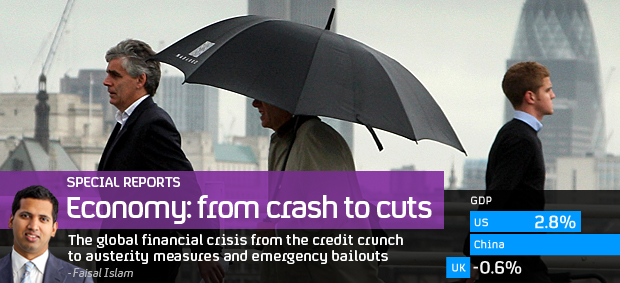Exclusive: UK economy likely to be shrinking now, says Weale
As Parliament rages about the European Union, the much more important impact of the Eurozone crisis on Britain’s economy was laid bare by Martin Weale, one of the nine-member committee that decides UK interest rates. He is the most hawkish current member of the MPC, having voted for rate rises consistently during his 15 month tenure. Now he explains the full impact of euro crisis on his thinking.
Mr Weale said that: “Looking at the economy at the moment I think the problems of the euro area and the knock on consequences for our banks, for business confidence, for the way consumers feel about things are likely to prove important … I certainly do think the underlying rate of growth of the economy is weak now and I wouldn’t be terribly surprised if we were to see output contract in the fourth quarter,” he told me in his office.
This is significant.
 The minutes, last week, of the Bank of England’s October meeting predicted that growth in the UK economy “would be close to zero”. Mr Weale’s comments suggest it is even worse than that and that we could well already be in recession. I asked if he thinks we might be very close to a recession:
The minutes, last week, of the Bank of England’s October meeting predicted that growth in the UK economy “would be close to zero”. Mr Weale’s comments suggest it is even worse than that and that we could well already be in recession. I asked if he thinks we might be very close to a recession:
“Obviously there is the risk of another recession and it’s higher than one might have thought a few months ago. But I’ve always said that it was quite impossible to say that a double dip couldn’t happen,” he said.
Again this is significant from Mr Weale, who just three months ago in July was voting for interest rates to rise to 0.75 per cent on concerns about inflation. In fact Mr Weale has been voting for a rate rise for just under half his entire tenure on the Monetary Policy Committee.
Clearly I asked for an explanation for this apparent about turn, and the answer, he says, is the economic prospects, and damage to confidence from the euro crisis. “It’s certainly a situation whose outcome is very difficult to predict or at least can’t be predicted with any sort of accuracy,” Mr Weale told me.
“If I speak only for myself, I find it difficult to, if you like, forecast how the Euro area crisis is going to be resolved. We hope that there will be a very clear resolution announced pretty quickly now and if that is a very clear resolution – I don’t think it would solve all of the underlying problems – policies announced by euro area ministers aren’t going to make the Greek economy competitive again or the Portuguese economy competitive again.
“So we can’t expect all of the underlying problems to be resolved, but if the euro area ministers do show that they are now getting grips with the situation and making the money available to support the banks in the Euro area in one form or another, and making the necessary credits available to those countries that need them then I could see some sort of improvement,” he said.
Make no mistake, this hawk has switched.
“It’s certainly the case that of the six recessions since the end of the First World War this looks to me like that with the weakest recovery. And in some sense that is a consequence of the adjustment that have built up – that are needed after the large levels of debt that have built up.”
I suggest to him that if the situation has changed so violently in three months for him to go from rate rises to £75bn more QE on account of the eurozone crisis, then surely they have changed sufficiently for some sort of change of fiscal policy from the Coalition Government.
He told me that changes in fiscal policy could see offsetting changes in monetary policy. But he also said: “It’s easy to understand why politicians are having trouble getting to grips with it but it is very difficult for a single policy authority, particularly a monetary authority in a relatively small open economy to be expected to resolve all of the economy’s underlying problems”.
It sounds like the man at the Bank thinks that Threadneadle Street can’t be expected to shoulder all the burden of boosting a flat, or even shrinking economy.
